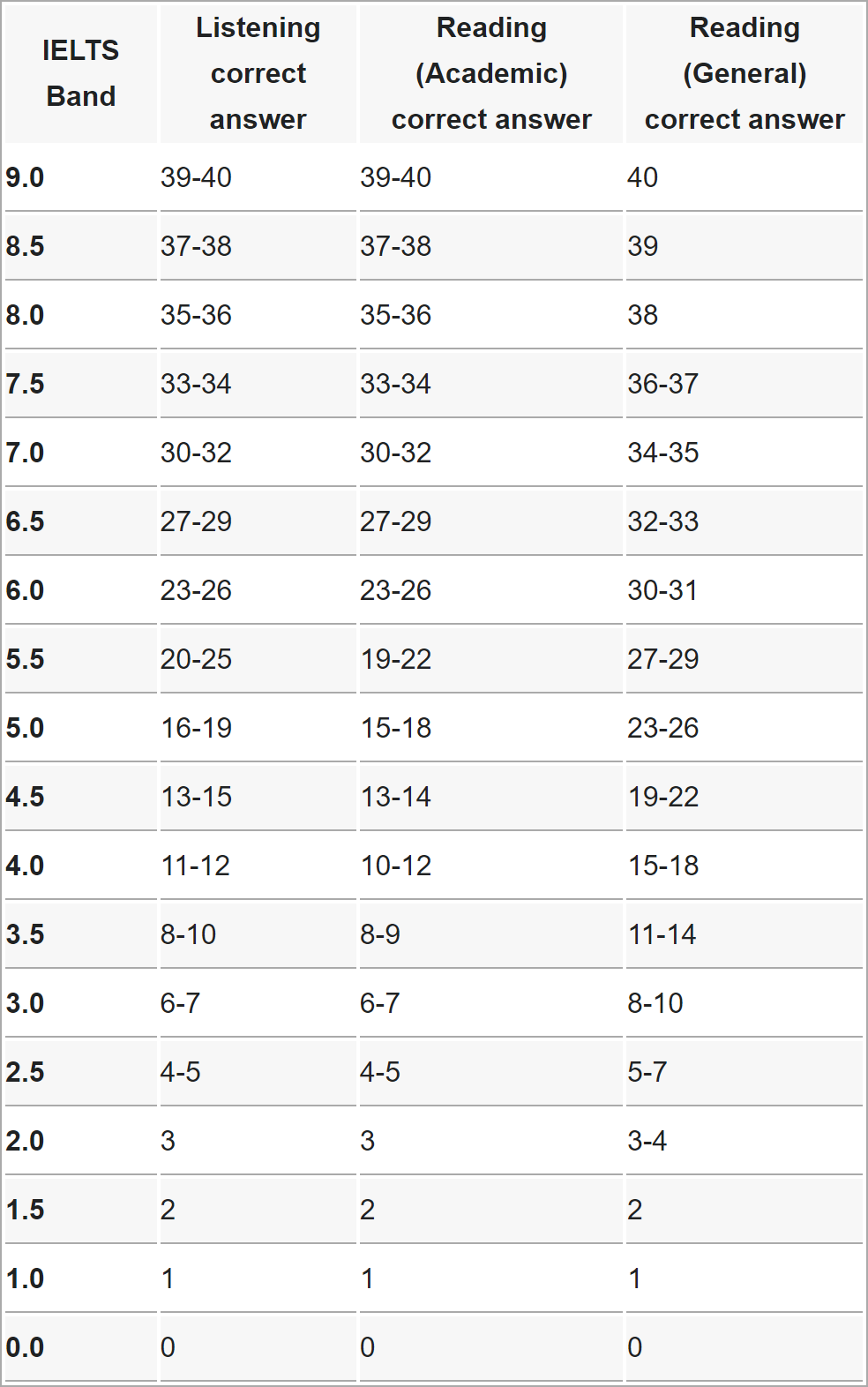The IELTS calculator is for overall band score and raw score calculation
The IELTS Calculator calculates the IELTS band score from raw scores in listening and reading and the overall band score from individual modules. The IELTS calculator is helpful for you if you wish to calculate your estimated IELTS band score.
The IELTS score shows your proficiency level in English from a 1 to 9 band score, 1 is the lowest, and 9 is the highest band. If you get 9 bands, it means you have an excellent command of English, and if you score 5, it shows that your English is average.
The IELTS Calculator is a free online tool for anyone who wants to know the overall score from individual scores they score in listening, reading, writing, and speaking. It also calculates the estimated IELTS band score using your raw scores. If you are planning to study or work in a country where English is the first language, this tool is needed.
The IELTS test is used to evaluate English language proficiency, not your level of intelligence. So,
you
can score a good band if you prepare properly. Most universities and employers accept the IELTS
test,
which is recognised internationally.

What is the IELTS calculator, and how does it work?
IELTS calculator is an online free tool that allows you to enter your scores in each test module, like listening, reading, writing, and speaking, and then calculate your estimated band score. It also calculates the estimated band based on your correct answer in academic and general reading and listening exams.
How does the IELTS calculator estimate my overall band score?
This IELTS overall band score calculator calculates your overall band score based on the scores you entered in the Listening, Reading, Writing, and Speaking sections. Then, the calculator uses algorithms of the official scoring guidelines and provides the overall band score you get out of 9.
For example, if you get 8 in listening, 7 in reading, 7 in writing, and 6.5 in speaking, in the mock test, it means you achieve an overall 7 band out of 9. You can use this online tool to calculate your own estimated band score and how much you can achieve in the IELTS test exam.
How does the IELTS raw score calculator calculate my band score?
With this calculator, you can get band scores from your raw scores that are correct in the test. First, you have to know how many questions you got correct out of 40 questions. This works only in listening and reading sections of academic and general IELTS. You have to enter your correct answer number and get how much it scores in the 9 band.
For example, if you got 32 correct answers out of 40 questions in the listening section then you can achieve 7 bands out of 9. In academic reading, if you are able to get 33 answers correct, then you get 7.5 out of 9 bands. But if you correct 33 questions in the general IELTS test, you can only achieve 6.5 out of 9 bands.
What information do I need to enter to use the IELTS score calculator?
To use the IELTS overall band score calculator, you need to enter your band scores for the Listening, Reading, Writing, and Speaking modules. After the calculation, you will get the overall band score in IELTS.
To use the IELTS raw score calculator, you have to enter the number of correct answers you got correct out of 40 questions in listening and reading modules. After calculation, you will get the individual band score out of 9. For academic IELTS and general IELTS, it is a different outcome. For example, if you get 33 answers correct in academic IELTS, you will get 7.5. But, if you get the same 33 answers correct in general IELTS, you will only score 6.5 out of 9.
Does the calculator provide band scores for all four IELTS sections?
In the overall band score calculation, all four modules' scores should be entered to get the overall band score. However, in raw score calculation, only the correct answers in listening and reading raw scores are needed to calculate the estimated band for each module out of 9.
How accurate are the estimated scores provided by the IELTS calculator?
Our online calculator is almost accurate based on information collected from online sources and official websites. This tool is for educational purposes, please do not depend solely on this tool. We suggest checking official websites and contact with authorised officials for more details.
What do the different band scores mean on the IELTS scale?
In academic and general IELTS there are four modules; listening, reading, writing, and speaking. All modules are calculated differently for individual band scores, and then the overall band score is calculated out of 9.
Should I rely solely on the IELTS calculator score for my preparation?
The IELTS calculator only calculates the overall band and band score from the raw score. This online tool only helps to know how much you score if you get particular correct answers. It helps to know the overall band score if you have an estimated score of individual modules.
How can I use the estimated score to improve my performance in the actual exam?
After using this tool, you can get your estimated band score, which gives you an idea of how much you should prepare for the real IELTS test. This website is not for exam preparation, this tool is for calculation, of how much you can achieve in a test. If you get less band after calculation, this indicates that you should prepare more to score more in real tests. Do your IELTS preparation on your own and come to this tool to check your ability and how much you can score.
What happens to the information I enter into the IELTS calculator?
This is a client-side serverless online tool website, it does not store any information you entered. We believe in the user's privacy, we do not require personal information like email, names, and phone numbers. You need to enter scores which is required to calculate the overall band score.
What happens if I encounter technical difficulties while using the calculator?
We believe it works smoothly on all devices like PCs, laptops, tablets, and mobile. Even if any technical issues are encountered, please do not hesitate to contact us from the Contact Us page.
Which resources are most reliable for official information about the IELTS exam?
IELTS IDP (https://ielts.idp.com) and the British Council IELTS (https://takeielts.britishcouncil.org) are trusted and reliable IELTS test providers. You can get insight from these official websites. You can get authentic and useful resources for the test from given websites. If you want to book a test then you can book from these sites, which are official test exam providers.
What are some tips for using the IELTS calculator effectively?
For effective use of this calculator, first, you have to take a mock test and secure raw scores, that is, how many answers you solve correctly. Then, enter that correct number in the calculator and the calculator provides you with how much you score out of 9. For overall band calculation, you need to have a band score of all four modules, then you can get your overall band out of 9. In this way, you can use the IELTS calculator very effectively.
How can I find my raw scores in each IELTS module?
Your raw score is the correct answers for each module out of 40 questions in the reading and listening sections. But in writing and speaking modules, the raw score is based on your performance and skill. You can evaluate yourself or evaluate with the help of the tutor.
You can see your raw scores in each module by checking your answer sheet for the listening and reading modules. However, in writing and listening, you can get them with the help of your teacher or mentor. Our IELTS calculator helps to get a band score from your raw scores in the reading and listening sections.
How are the raw scores converted into band scores?
The raw scores are converted into band scores using a conversion table, but the conversion table is not publicly available, so you use the IELTS calculator to estimate your band score with your raw score. For that, you have to know your raw score.
How can I choose which version of IELTS to take?
You should choose the IELTS version according to your purpose and need. If you are applying for academic studies, you should take the academic IELTS. And, if you are applying for work or migration, you can go with general IELTS.
How long is the IELTS test, and what does it contain?
The IELTS test has four modules: listening, reading, writing, and speaking. The time of the IELTS test is about 2 hours and 45 minutes. The listening module is approx. 30 minutes and has four sections with 10 questions in each section and 40 questions in total. The reading module is for 60 minutes and has 3 sections with 40 questions in total. The writing module is given 60 minutes for two sections. The speaking module time duration may vary from 10 to 15 minutes, with the introduction, speaking on topics, and discussion sections.
Can the IELTS calculator estimate band scores for individual sections?
The IELTS calculator calculates band scores for the listening and reading sections with the help of your correct answers in academic or general IELTS. You can enter your correct number of answers for each section and get an estimated band score.
Is there any fee to use the IELTS calculator?
No, the IELTS calculator is a free online tool. It does not cost any fee for the users.
Can I use the IELTS calculator to prepare for the test?
No, the IELTS calculator is not a study resource. However, it can be helpful to understand the scoring system and how marking is done for each section. It also helps to get an overall band score.
Why is it important to know the IELTS raw score?
Knowing your IELTS raw score can help to guess your test band before taking a real test. Your raw score can also help you to study more effectively for your test. If you know the questions you did wrong, you can study well, which will help you get a good score on your real test. You may know the overall band score after the test but not the raw score.

References
- https://takeielts.britishcouncil.org/
- https://ielts.idp.com/
- https://takeielts.britishcouncil.org/take-ielts/what-ielts
- https://takeielts.britishcouncil.org/take-ielts/test-format
- https://takeielts.britishcouncil.org/take-ielts/which-ielts-test




